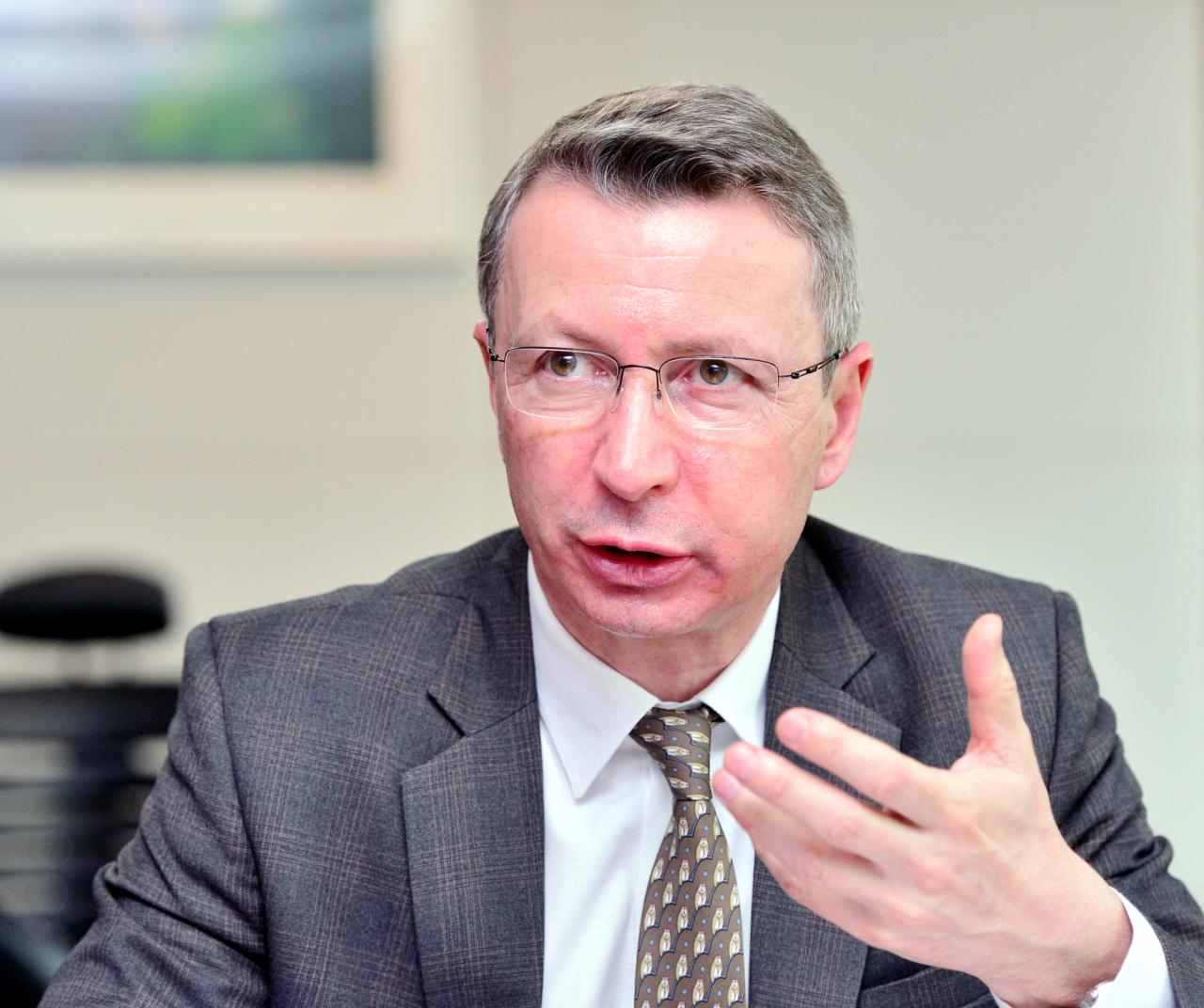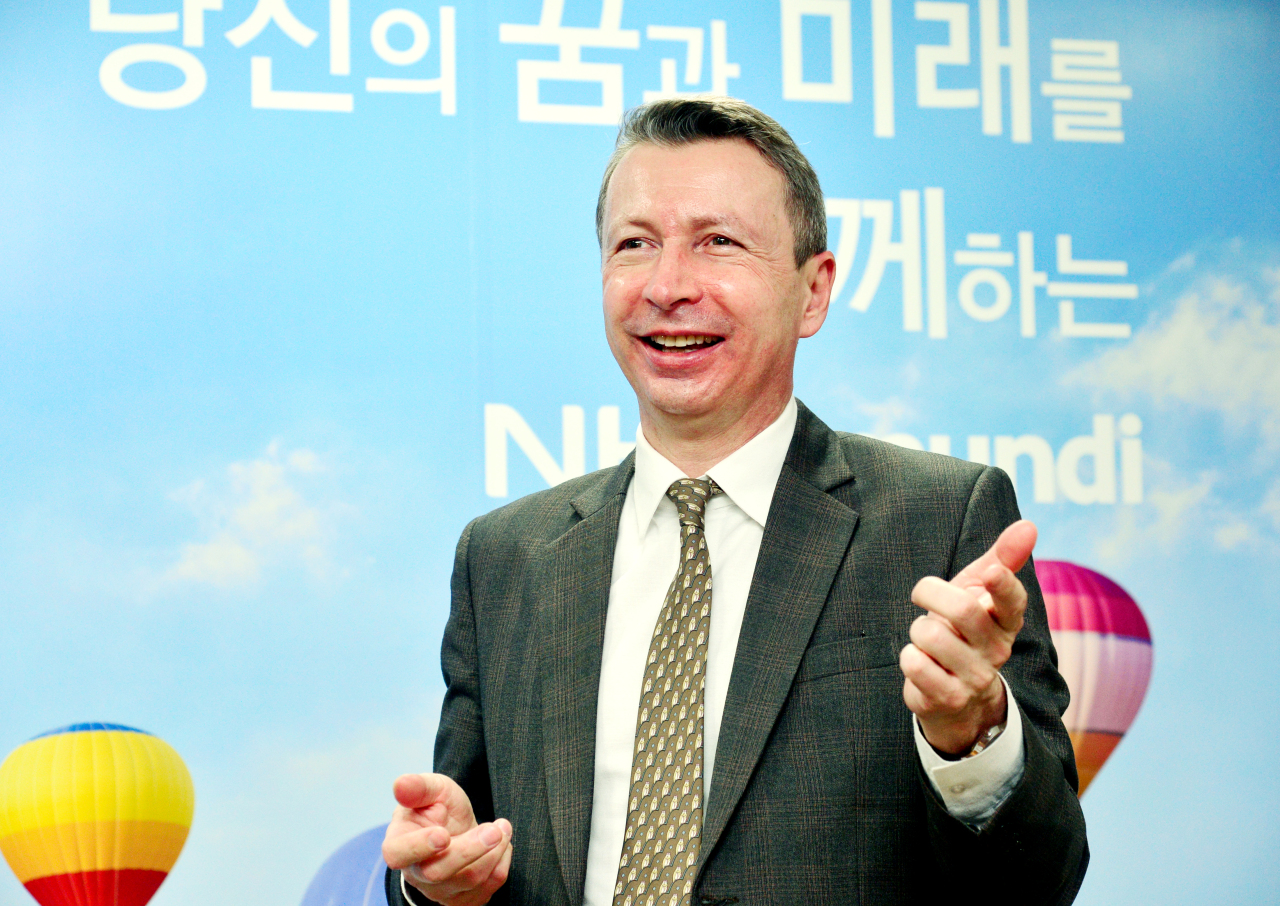[#WeFace] ESG investing: Not just about financial performance, but also social responsibility
Young generations behind the rise of ESG awareness in Korea, says NH-Amundi deputy CEO
By Jie Ye-eunPublished : May 18, 2021 - 16:24

The Korea Herald is publishing a series of interviews with executives of South Korea’s leading corporations on their response to environmental, social and corporate governance, or ESG, issues, which have become central factors globally in measuring the sustainability of an investment or business decision. -- Ed.
Despite South Korea’s relatively short history of investing related to environmental, social and governance issues, local financial companies have been jumping on the ESG bandwagon in pursuit of new investing opportunities.
Having ESG in a corporate slogan, however, does not guarantee any positive outcome, a top foreign executive in Seoul said, stressing the need to establish a particular process to practice such investing strategy.
“To launch ESG funds, you need an ESG investment process. In many companies, they declare themselves ESG but there is no process. Then the outcome is not under control,” Nicolas Simon, deputy CEO at NH-Amundi Asset Management said in an interview with The Korea Herald.
“You cannot launch a product if you aren’t very robust on the process. The process has to be strongly commended based on research and model portfolios. An ESG company that (is) truly committed as a responsible investment company has to be precise in terms of transparency to avoid greenwashing.”
Simon, who joined the Seoul-based joint venture between NongHyup Financial Group and Amundi Asset Management in July to speed up its ESG strategy, is a renowned expert on sustainable business management and investing.
With 15 years at Amundi under his belt, the deputy CEO introduced Europe’s largest asset management firm’s ESG business strategy and process to NH-Amundi employees in March, in line with the company’s new vision of an ESG-centered business.
“Amundi CEO said, ‘you cannot declare yourself responsible overnight. You need to build it overtime, and you need to prove it.’ Because NH-Amundi is a joint venture, our DNA has been inherited from the two companies of being a responsible investment firm,” Simon said.
ESG investing has gained momentum from last year with major institutional investors vowing to exercise a stewardship code. Compared to other advanced markets, Korea is a little behind the trend but the country is catching up with the global trend of socially conscious investments, he said.
According to market data, the number of ESG-related funds came to 89 in the first quarter, up 21.9 percent on-year. The combined assets under management by local firms marked a record high of 6.36 trillion won ($5.59 billion) with the new capital inflow worth nearly 1.94 trillion won.
The top executive attributed the surging figures to the unprecedented pandemic, and the government’s initiatives for the New Deal and its commitment to Korea achieving carbon neutrality by 2050, which presented ESG investing opportunities to investors.
Despite South Korea’s relatively short history of investing related to environmental, social and governance issues, local financial companies have been jumping on the ESG bandwagon in pursuit of new investing opportunities.
Having ESG in a corporate slogan, however, does not guarantee any positive outcome, a top foreign executive in Seoul said, stressing the need to establish a particular process to practice such investing strategy.
“To launch ESG funds, you need an ESG investment process. In many companies, they declare themselves ESG but there is no process. Then the outcome is not under control,” Nicolas Simon, deputy CEO at NH-Amundi Asset Management said in an interview with The Korea Herald.
“You cannot launch a product if you aren’t very robust on the process. The process has to be strongly commended based on research and model portfolios. An ESG company that (is) truly committed as a responsible investment company has to be precise in terms of transparency to avoid greenwashing.”
Simon, who joined the Seoul-based joint venture between NongHyup Financial Group and Amundi Asset Management in July to speed up its ESG strategy, is a renowned expert on sustainable business management and investing.
With 15 years at Amundi under his belt, the deputy CEO introduced Europe’s largest asset management firm’s ESG business strategy and process to NH-Amundi employees in March, in line with the company’s new vision of an ESG-centered business.
“Amundi CEO said, ‘you cannot declare yourself responsible overnight. You need to build it overtime, and you need to prove it.’ Because NH-Amundi is a joint venture, our DNA has been inherited from the two companies of being a responsible investment firm,” Simon said.
ESG investing has gained momentum from last year with major institutional investors vowing to exercise a stewardship code. Compared to other advanced markets, Korea is a little behind the trend but the country is catching up with the global trend of socially conscious investments, he said.
According to market data, the number of ESG-related funds came to 89 in the first quarter, up 21.9 percent on-year. The combined assets under management by local firms marked a record high of 6.36 trillion won ($5.59 billion) with the new capital inflow worth nearly 1.94 trillion won.
The top executive attributed the surging figures to the unprecedented pandemic, and the government’s initiatives for the New Deal and its commitment to Korea achieving carbon neutrality by 2050, which presented ESG investing opportunities to investors.

“When I arrived in Korea, I was very happy to see that ESG awareness was coming up. Maybe two or three years ago, it was not the case. The 2020 was really a breakthrough that we needed a tipping point in the market of awareness of ESG, being enforced by the two factors,” he said.
It is both push and pull -- with government initiatives, company commitments on one side, and public awareness and public demand on the other, and especially from the young generations, he explained, adding examples of efforts to manage the climate crisis and recycling.
The French deputy CEO also pointed to Korea’s “bbali, bbali” culture. The phrase, meaning “hurry, hurry,” reflects an attitude that seems to have hastened the spread of ESG awareness.
In the asset management business, creating derivative performance is important, but managers have strong responsibility on social responsibility, the expert highlighted. Being responsible is not really a cost in terms of performance but it is an advantage, he added.
“Profit for profit doesn’t work anymore. Profits should be channeled through goals. … So (ESG investing means) not only you provide financial performance but also provide meaning to social responsibility.”
Simon formerly served his five-year term as a deputy CEO of State Bank of India Funds Management, a joint venture of State Bank of India and Amundi to lead Amundi’s Indian operation, before joining NH-Amundi. He joined Amundi as CEO of Amundi Real Estate from 2005 to 2015.
NH-Amundi has been a well-known asset management firm operating the largest socially responsible funds in Korea. Among six ESG-related funds launched by the company, Centennial Company Korea ESG, which is also dubbed Green Korea Fund, is its representative product.
Benchmarking the MSCI Korea ESG Universal Capped index, the fund was launched on Sept. 3 and its AUM and net asset value were 254.1 billion won and 320.9 billion won, respectively, as of Friday.
Last year, the firm created an ESG-specialized research team trained by Amundi’s experts. It has also launched an intraboard ESG committee in March to create the full comprehensive framework for as an ESG company under the vision of “ESG First.”
By Jie Ye-eun (yeeun@heraldcorp.com)
It is both push and pull -- with government initiatives, company commitments on one side, and public awareness and public demand on the other, and especially from the young generations, he explained, adding examples of efforts to manage the climate crisis and recycling.
The French deputy CEO also pointed to Korea’s “bbali, bbali” culture. The phrase, meaning “hurry, hurry,” reflects an attitude that seems to have hastened the spread of ESG awareness.
In the asset management business, creating derivative performance is important, but managers have strong responsibility on social responsibility, the expert highlighted. Being responsible is not really a cost in terms of performance but it is an advantage, he added.
“Profit for profit doesn’t work anymore. Profits should be channeled through goals. … So (ESG investing means) not only you provide financial performance but also provide meaning to social responsibility.”
Simon formerly served his five-year term as a deputy CEO of State Bank of India Funds Management, a joint venture of State Bank of India and Amundi to lead Amundi’s Indian operation, before joining NH-Amundi. He joined Amundi as CEO of Amundi Real Estate from 2005 to 2015.
NH-Amundi has been a well-known asset management firm operating the largest socially responsible funds in Korea. Among six ESG-related funds launched by the company, Centennial Company Korea ESG, which is also dubbed Green Korea Fund, is its representative product.
Benchmarking the MSCI Korea ESG Universal Capped index, the fund was launched on Sept. 3 and its AUM and net asset value were 254.1 billion won and 320.9 billion won, respectively, as of Friday.
Last year, the firm created an ESG-specialized research team trained by Amundi’s experts. It has also launched an intraboard ESG committee in March to create the full comprehensive framework for as an ESG company under the vision of “ESG First.”
By Jie Ye-eun (yeeun@heraldcorp.com)




![[Herald Interview] 'Amid aging population, Korea to invite more young professionals from overseas'](http://res.heraldm.com/phpwas/restmb_idxmake.php?idx=644&simg=/content/image/2024/04/24/20240424050844_0.jpg&u=20240424200058)













![[KH Explains] Korean shipbuilding stocks rally: Real growth or bubble?](http://res.heraldm.com/phpwas/restmb_idxmake.php?idx=652&simg=/content/image/2024/04/25/20240425050656_0.jpg&u=)

